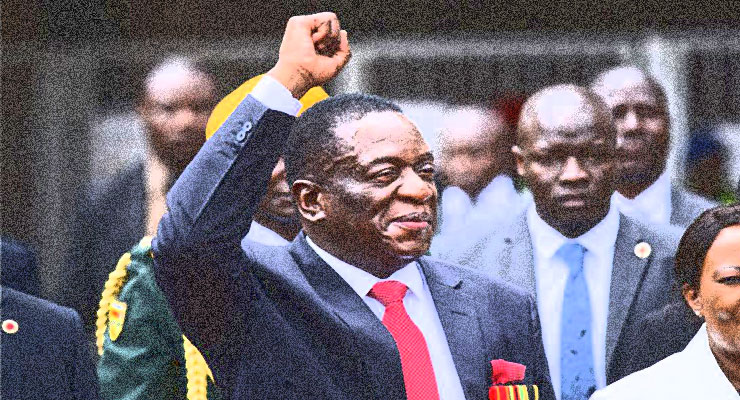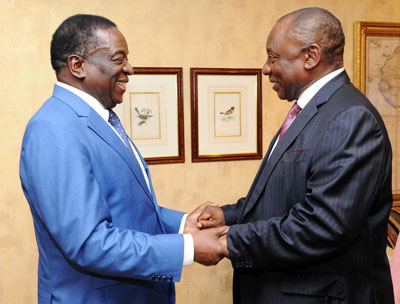
Zimbabwe’s new President Emmerson Mnangagwa was recently all over social media telling everyone who cares to listen the achievements that his government has made since taking over on 24 November 2017. But with his administration reaching its 100-day in office on Sunday 4 March, what has it actually achieved?
It was very interesting to compare Mnangagwa’s inauguration address, which contained to do list, to the most recent comments. Assembling a new list of the most important 100 things that the government has done since it was elevated through a military coup shows that all is not quite as straightforward as Mnangagwa implies.
While the inauguration address provided a reliable roadmap in many respects, in others the government has diverted quite strikingly from what was on offer to the people of Zimbabwe last November. It seems that even through Mnangagwa’s government has enjoyed relatively benign political competition, with the main opposition MDC-T in disarray, its record since November also reveals quite a lot about its weaknesses.
In the eyes of many, Mnangagwa stood for fighting corruption, a plague is costing the country upwards of US$4 billion annually in lost revenue. His calls for an anti-corruption push were by far the most important statement from government since taking over.
The Alias Generation 40 (G40) alleged members who supported the former president Robert Mugabe such as former finance minister Ignatius Chombo, former Tourism and Hospitality minister Walter Mzembi, former Energy minister Samuel Udenge, and many others have since been arrested. But sadly, Team Lacoste members that cultivated Mnangagwa’s rise to power are not being prosecuted and pressure is mounting for the Mnangagwa administration to act on individuals like Obert Mpofu who is currently Home Affairs and Cultural Heritage minister and who superintended the mines ministry when an alleged US$15 billion in diamonds revenue was lost.

Resuscitating the economy has been another priority. Mnangagwa has been around the African region and as far away as the Davos meeting in Switzerland selling economic reforms that so far have amounted to just talk without any concrete practical action on the ground.
Zimbabwe is ranked 159 among 190 economies in the ease of doing business. Mnangagwa’s government has yet to act on fostering a regulatory environment conducive to increased business operations or put in place stronger protection of property rights. Government should be working to reduce the time it takes for new company registration and the bureaucracy associated with the need for multiple licenses from several ministries to operate any business.
The amending of the Companies Act so as to stimulate local and international investment and improve ease of doing business was a noble effort but it is taking forever to implement despite having been on the cards for a long time. Formation and registration of companies remains complex and there is inadequacy of laws to act on poor corporate governance in companies.
Among the greatest of the accomplishments so far is the revamping of the land deeds department to enable online deeds search and to update the companies’ database is encouraging as it will stimulate local and foreign investment due to efficient access to information.
All of this was in Mnangagwa’s inauguration speech. But the speech was woefully lacking specifics on where the resources to turnaround the economy would come from, and how the government intends to service its unsustainable domestic and foreign debt of about US$13 billion to encourage new debt capital flow. With long standing external arrears, foreign financing has been scarce, large fiscal deficits are lately being financed through domestic borrowing that is so substantial as to crowd out more productive private sector borrowing.
Even though the government has been in power for just more than three months, it has already had to postpone or shelve major initiatives. Ministers have their own explanations, although it is embarrassing that important infrastructure proposals such as the duplication of the Beitbridge-Harare road linking Sub-Sahara’s busiest inland border post with the rest of Africa, rail modernization, and the digitization of the airwaves have now taken a back seat.
As the 100-days audit shows, in some respects the government has been constrained by pre-existing parliamentary weakness. Ministers in most instances fail to show up for question and answers sessions and some even refuse to subject themselves to parliamentary committees for accountability. Furthermore, ministers fail to submit annual reports of state owned companies under their control and nothing has been done by parliament to correct these intentional diversions.
The government is also taking its time over repealing some restrictive sections of the dreaded Public Order and Security Act (POSA), Access to Information and Protection of Privacy Act (AIPPA) and the Broadcasting Services Act all which infringe on freedom of expression, something that does not augur well with the ease of doing business in the modern world.
The 100-day audit provided by Zimbabwe’s Mnangagwa is revealing because it contains measures that could never have been accomplished within the prescribed period such as amending legislations and finding a partner for the endlessly struggling Air Zimbabwe, a state run company saddled with over US$300 million in debt. Although last week Mnangagwa received 157 wagons, seven locomotives and seven coaches from Transnet, South Africa’s state-owned rail, port and pipeline company, for the National Railways of Zimbabwe (NRZ), marking a step towards the country’s revival of the railway system and the economy, the NRZ will have to work hard to win back business trust through revamping its dilapidated rail network and speeding up delivery of consignments.
All in all the first 100-days have failed to live up to the billing that characterized the popular enthusiasm following Mnangagwa’s inauguration speech. However, judging a whole government in 100-days may not be fair because most activities require a timeframe beyond to materialize. Time will tell.
Leave a Reply